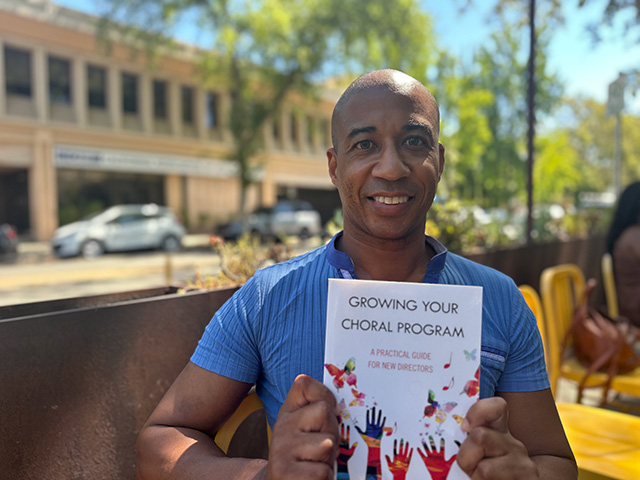
Nicolás Alberto Dosman was just 10 years old when he decided he wanted to run a music program. He quickly achieved that goal after graduating college, becoming a high school and middle school music teacher and choral director in Miami, Florida. The reality of the job, though, wasn’t exactly what he’d expected.
“I realized I didn’t know enough and many of the wonderful scholarly things I learned in school as an undergraduate were not applicable or practical,” Dosman said.
Dosman majored in music education. He didn’t know how to deal with administrators or parents. He didn’t know how to help students who were navigating social and emotional issues. Even holding rehearsals was a challenge when dealing with high schoolers, especially those who had little experience, and who were juggling homework, jobs and other activities.
Hungry for answers, he read books, attended conferences and reached out to mentors. As he became more experienced and confident in his position, he realized up-and-coming choral and band directors were facing the same gaps. Dosman shared what he had learned, but wondered why all these basics weren’t being taught or, at least, available in an accessible, easy to read book.

In the two decades since starting his career, Dosman earned a doctorate in music education and led the choral program at the University of Southern Maine, Osher School of Music, among other school, church and community choirs. He joined UC Davis last year as the director of choirs and an assistant professor of teaching. And, in July, his book Growing Your Choral Program: A Practical Guide for New Directors was published by Rowman & Littlefield Publishers.
The guide is meant to provide solutions to some of the common problems new choral directors face.
“It’s a catch all,” he said. It’s geared towards those just joining the profession at any level or who are considering a career transition.
Adapting to a new generation
Dosman’s 147-page book covers such topics as choral philosophies and approaches, programming and logistics, strategies for notational literacy and vocal technique, diverse repertoire selections, choral program management, lesson and rehearsal planning and leadership skills. Throughout, Dosman pulls not just from his own experience but also the work and research of others established in the field.
In writing the book, Dosman tried to be thoughtful about how culture has changed over time and how choirs can adapt to these changes.
“Sometimes our profession gets stuck in old practices and old ways of thinking where we don’t acknowledge the world that we’re in,” he said.
This is particularly true for those who identify as LGTBQIA+, or anyone whose appearance and vocal range may not fit into the profession’s historical norms and expectations. Gender and presentation are more fluid now, so it makes sense for a choir to mirror those changes, for example, by doing away with the binary dress code: women in gowns, men in tuxedos.
Even in voicing, Dosman said he has had at least one student start as high as soprano only to transition through to the much lower baritone.
“I was never prepared to deal with that or trained to help students who were going through that transition and music is not written for that,” Dosman said. “It doesn’t have to be so rigid."
Part of the book also includes examples of accessible music new directors can use to diversify their programs and create a culture of inclusivity from the outset. Suggested pieces are from classical European sources as well as Middle Eastern, African American and South American cultures, including music in Spanish.
“Everybody knows Bach, Beethoven and Mozart. They’re wonderful composers, but they’re not the only composers who walked the face of the Earth,” Dosman said. “I thought this book needed to be written in a way where, no, this is just as valid as any other group, and diversity is valid and it’s not just a special thing that we talk about because we want to be politically correct. Why not just be inclusive of everybody to begin with?”
